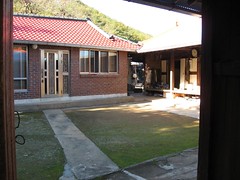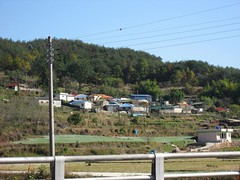 Last week Korean Grandmother had - apparently - fallen ill and there was talk that this was 'her time'. It had been three weeks since my girlfriend and I had arrived in Korea, and their disappointment that we had not yet visited was made known during the subsequent flurry of communications between Busan and the island of Namhae (tagline - 'the Leading Namhae that is a good place to live'), where they lived. So, a family trip was arranged, and held to even when Grandmother turned out to be fine later the same day when Korean Father travelled there directly.
Last week Korean Grandmother had - apparently - fallen ill and there was talk that this was 'her time'. It had been three weeks since my girlfriend and I had arrived in Korea, and their disappointment that we had not yet visited was made known during the subsequent flurry of communications between Busan and the island of Namhae (tagline - 'the Leading Namhae that is a good place to live'), where they lived. So, a family trip was arranged, and held to even when Grandmother turned out to be fine later the same day when Korean Father travelled there directly.So it was on Sunday I spent what seemed like most of my day on various Korean buses to get to Namhae, travelling through some spectacular countryside and possibly over Korea's oldest suspension bridge. The taxi driver that took us on the final leg of our journey told us that this rural area used to have 137,914 people thirty years ago, but now there are 54,392. Everyone's moved to the cities, especially Busan, and such is the desire of the local government to stem this depopulation they offer 300,000 won per month for couples who move there, and free university tuition. It wouldn't have been enough to convince me having been there five minutes; the area was certainly beautiful, and amazingly quiet, but the lack of shops and the distances between places of use were a real shock after the convenience of Busan.
Despite being modernised four times in its seventy year history, Korean Grandparents' house was small and cold. I ate lunch wondering whether growing up under Japanese occupation and then through two major wars made the cold and the flies bearable, but it was too much for me - I guess I'm from a city and I don't have the same concept of hardship older generations have.
 Having made our obligatory appearance, had lunch, and went for a brief walk in the nearby countryside. Perhaps I have a romanticised view of small Japanese villages which I expected to find the Korean equivalents of - but the reality was typically haphazard collections of oddly-coloured boxes of no fixed architecture, which made the Korean countryside appear to be a paradox of stunning scenery punctuated by randomly dropped shanty-towns. A real shock - click on the image for the picture in all its horror.
Having made our obligatory appearance, had lunch, and went for a brief walk in the nearby countryside. Perhaps I have a romanticised view of small Japanese villages which I expected to find the Korean equivalents of - but the reality was typically haphazard collections of oddly-coloured boxes of no fixed architecture, which made the Korean countryside appear to be a paradox of stunning scenery punctuated by randomly dropped shanty-towns. A real shock - click on the image for the picture in all its horror.After our walk we set off back to the city. Our taxi driver had warned us that traffic back would be bad today because so many people had come to the area the day before, and sure enough he was right - the return journey was a nightmare, taking three and a half hours versus the two we had spent outbound.
But the real story of our return is not the when, but the how. Before setting off our bus driver asked if anyone on board suffered from motion sickness (never a good sign), and on failing to illicit a positive response announced that we would take 'a short cut' back. This transpired to mean vaguely following the highway towards Busan but weaving around (and under) it rather than actually driving on it. At one point our bus squeezed through a tunnel under the highway little bigger than the bus iteslf, drove for 50 meters before a similar return tunnel took us back to the original side, and another tunnel saw us swap sides again. At some points the roads we took felt like little more than dirt tracks but I had to stop looking eventually.
A mystery was thrown up in Namhae from a road sign. Not the one that read 'Agricultural Traning Center', because official looking but incorrectly spelt signs are common here, but rather the one that read 'German Village'. On pointing this out our driver told us that there were in fact, quite a few Germans living there (on 'benefits' allegedly - is there such a thing in Korean though?), and hence the name. So there you have it - a small German enclave at the southern tip of the Korean Peninsula - further investigation reveals a surprising story of returning Korean emigrates and their German spouses living in their German-style houses in this quiet corner of Korea. On the way out of Namhae another sign pointed to 'American Village' - where perhaps the next chapter of this bizarre story will be played out.
Of its own people Namhae says, "There children’s success have been their greatest pleasures, while their backs have gotten bent due to the hard work farming on the small steep mountain slops" (sic). I took home the message that while I may be able to live in comfort in the city, not to forget that perhaps this is in fact, the real Korea - and one which mourns the loss of its children to the cities - while dreaming up schemes to bring people back.



2 comments:
Hi, I came across this post while googling "Namhae American Village." Any word on if it's open? I saw, like you, signs pointing to it, but poking around the internet turned up nothing.
Have you been to the German Village? I went a few weeks ago. It's charming, but I feel really bad for the people living there. It was overrun by tourists---the site was also used to film a drama---and everyone was on the look out for Germans. I had assumed it was just a camp of some sort . . . had I known people actually lived there, and were trying to relax and retire, I don't think I would have been as nosy.
Anyway, the reason I'm commenting is b/c I wanted to show you an article about the German Village I found on the NYTimes. http://www.nytimes.com/2005/08/09/international/asia/09korea.html The people living there were actually receiving benefits, haha.
Thanks for the New York Times Link
Actually I believe there are incentives for people to move to Namhae generally because of the declining population problem - although individual towns may implement their own policies.
I didn't go to the German Village as it was just a flying visit to Namhae at the time, and when we spent a bit more time there for the funeral sightseeing wasn't really an option.
I've no idea what the American Village must be like. I have visions of some kind of 'Truman Show' town except populated by Koreans, but I'm sure the reality is somewhat different.
As you say, there really doesn't seem to be much information on the English Internet. I'll get my wife to search some Korean sites later...
Post a Comment